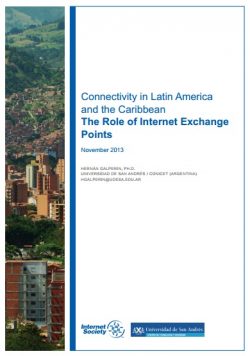This report takes stock of the development of Internet Exchange Points (IXPs) in Latin America and the Caribbean, documenting best practices in four selected cases: Argentina, Brazil, Colombia and Ecuador. It argues for accelerating the develop-ment of IXPs as a necessary step towards improving the quality and coverage of access services in the region.
Internet connectivity is increasingly recognized as a fundamental lever for development. While basic connectivity to the global Internet is available throughout Latin America and the Caribbean region, the state of the Internet infrastructure varies widely between countries as well as among geographical areas within countries themselves. This results in large variations in the price, the quality, and the coverage of internet access services across the region. Improving the state of internet infrastructure is a major challenge for the region over the next decade.
Both theoretical models and practical experiences indicate that further development of Internet exchange points (IXPs) in the region can make a significant contribution to this goal. IXPs refer to interconnection facilities in which different players in the Internet ecosystem (ISPs, content providers, hosting companies, etc.) exchange IP traffic. They range from small exchanges interconnecting local ISPs at the city or municipal level to large distributed facilities connecting hundreds of networks at the regional level. This report takes stock of the development of IXPs in Latin America and the Caribbean, documenting best practices in four selected cases: Argentina, Brazil, Colombia and Ecuador. It argues for accelerating the development of IXPs as a necessary step towards improving the quality and coverage of access services in the region.
Lea el informe en español.
